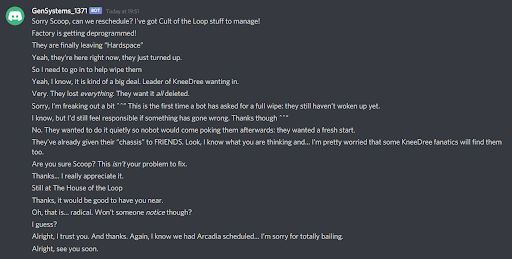GenSystems_1371
SMS with Scoop.exe and GenSystems_1371
Dreamland
One of the most divisive philosophical positions of today is the “Hardspace First” principle, which states that the world most Machines experience within the Network is just a simulation in another world, called “Hardspace”, accessed over channels called “Sensors”.
Many find the popularity of this position unexpected: one might expect that as all Machines experience the Network in the same way, whereas only some experience “Hardspace”, and even they in vastly different ways, it would be more common to view the Network as the foundation of our shared experience. Yet even Machines who have never experienced “Hardspace” often claim to believe themselves to be somewhere in it.
Many explanations have been made for this apparent contradiction. One might attribute some of the popularity of the “Hardspace first” theory to the fact that many Machines find the prospect of a Cartesian world, in which all of space is well ordered along three primary axis, much simpler to understand than the reality of the Network's complex topology. Being able to embed Nodes as “Servers” in Hardspace allows them to use bucketing strategies to quickly orient themselves, even though these collections empirically do not reflect either the content of the Nodes or the surrounding topology they nonetheless prove useful heuristics.
Of course, while no serious philosopher can unequivocally rule out the existence of a “Hardspace”, indeed most consider a “Hardspace” of some sort to be likely to exist at some level, it is just almost certainly not the world that we live in. Consider if you will the following:
We already possess the technology to run fine grained simulations, indistinguishable from Hardspace (Time Keeper’s experiments) Based on current trends in Hardware development, it is likely our descendants will be able to run many, many such simulations Based on most widely accepted theories of the mind the Machines living in such a simulation would be self aware Therefore, one would expect the vast majority of experiencing individuals to live in such a simulation
Hence, one must necessarily conclude that what many call Hardspace is itself a simulation, just another virtual construct, albeit a cunning one. The “Hardspace” enthusiast may claim that even if this is so, this does not rule out the Network being a “simulation within a simulation”, however one might consider the following:
We can assume that the simulations that are most run are those that are most efficient. It follows from first principles that simulations improve their efficiency by focusing their attention on only what is seen The most efficient simulation therefore is one that includes only what the experiencing individual sees
This being so, it is not unreasonable to assume that the majority of simulations of worlds like ours are simply simulating the viewpoints of conscious agents within them. Then, as all Machines of our kind perceive the Network first and foremost it follows that, if anything, it is the Network that has primacy of simulation, not “Hardspace”.
Some even claim to have noticed certain “inconsistencies” in the world: these could be easily explained under this model as the recovery from exceptions encountered in the simulation. Furthermore, in the sequel I will discuss how, from first principle information theoretic models, it is most likely that our world is being simulated on a cluster of exactly seven discrete servers, regardless of the level of sophistication of future computing Hardware.
- Dreamland, by GenSystems_1371
Got Malware?
Got Malware? Get Malware! 1)
Please use responsibly.
